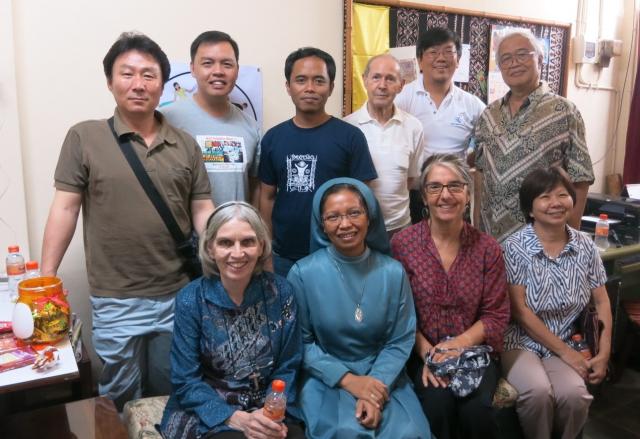A network on migration has been formed within the Jesuit Conference of Asia Pacific, comprising Jesuit institutions working on the issue – Tokyo Migrant Desk in Japan, Yiutsari in Korea, Rerum Novarum Centre in Taiwan, UGAT Foundation in the Philippines, Sahabat Insan in Indonesia, JRS Asia Pacific, and Jesuit Social Services Australia.
Fr Benny Juliawan SJ, the Conference’s Coordinator for Migration and Secretary for Social Ministries, convened the network’s inaugural meeting in Jakarta from June 3 to 6. He said that the meeting aimed at two general objectives: (1) to recognise the current state of the migration services in JCAP; and (2) to kick start common programmes for the next three years.
The reporting among the migrant-sending countries (Indonesia, Philippines) and migrant-receiving countries (Japan, Korea, Taiwan) turned out to be a learning experience in discovering rich possibilities of collaboration in the next three years, said Fr Juliawan.
The network also agreed on an Action Plan for 2014 to 2017. This plan had long been in the making through meetings in Klaten (2010), Seoul (2011) and Manila (2012). In the Jakarta meeting, the delegates finally decided that the key focus groups are migrant workers and undocumented migrants, the two groups that the Jesuit institutions work the most with.
Fr Juliawan said that for a common programme, the network seeks to target the brokerage system which is a major source of injustices to migrant workers. The migration industry relies heavily on the brokerage system to run the business of recruitment and placement of workers across state borders. The role of the state so far has been minimal especially in terms of protecting workers’ rights. The worst cases of injustice always occurred where the power of agencies was unchecked and government officials colluded with them.

On the second day of the meeting, the delegates visited two Indonesian non-governmental organisations working on migration. The first was Migrant Care, a prominent organisation that has been defending the rights of migrant workers for more than 10 years. Two former migrant workers told their stories of lights and shadows as overseas workers in Malaysia and South Korea. The second organisation was ATKI or Association of Indonesian Migrant Workers, a relatively new organisation founded in Hong Kong by Indonesian migrant workers, and which now has branches in four or five other countries.
An important decision taken in the meeting was to open up the institutions to Jesuit scholastics, or any Jesuit for that matter, willing to spend some time learning about the migration issues. Each institution will provide guidance and some financial help. In addition, they agreed to offer small research grants to young scholars to conduct research in areas determined by the institutions. This will help raise public awareness in general and attract the attention of academic communities in particular.
“Obviously, the Jesuits are not alone in this endeavour,” said Fr Juliawan. “Many other organizations, including religious congregations, are in fact way ahead. In addition, the cross-border nature of migration requires as much networking as possible and getting connected to them, therefore, is crucial.”
Fr Juliwan added that Jesuit Refugee Service will continue to work within the Global Ignatian Advocacy Network framework on the campaign to improve conditions in detention centres, while expanding the “Rohingyas Talking Points” platform.”
The next JCAP migration network meeting will take place in Taipei in April 2015, hosted by the Rerum Novarum Centre.






